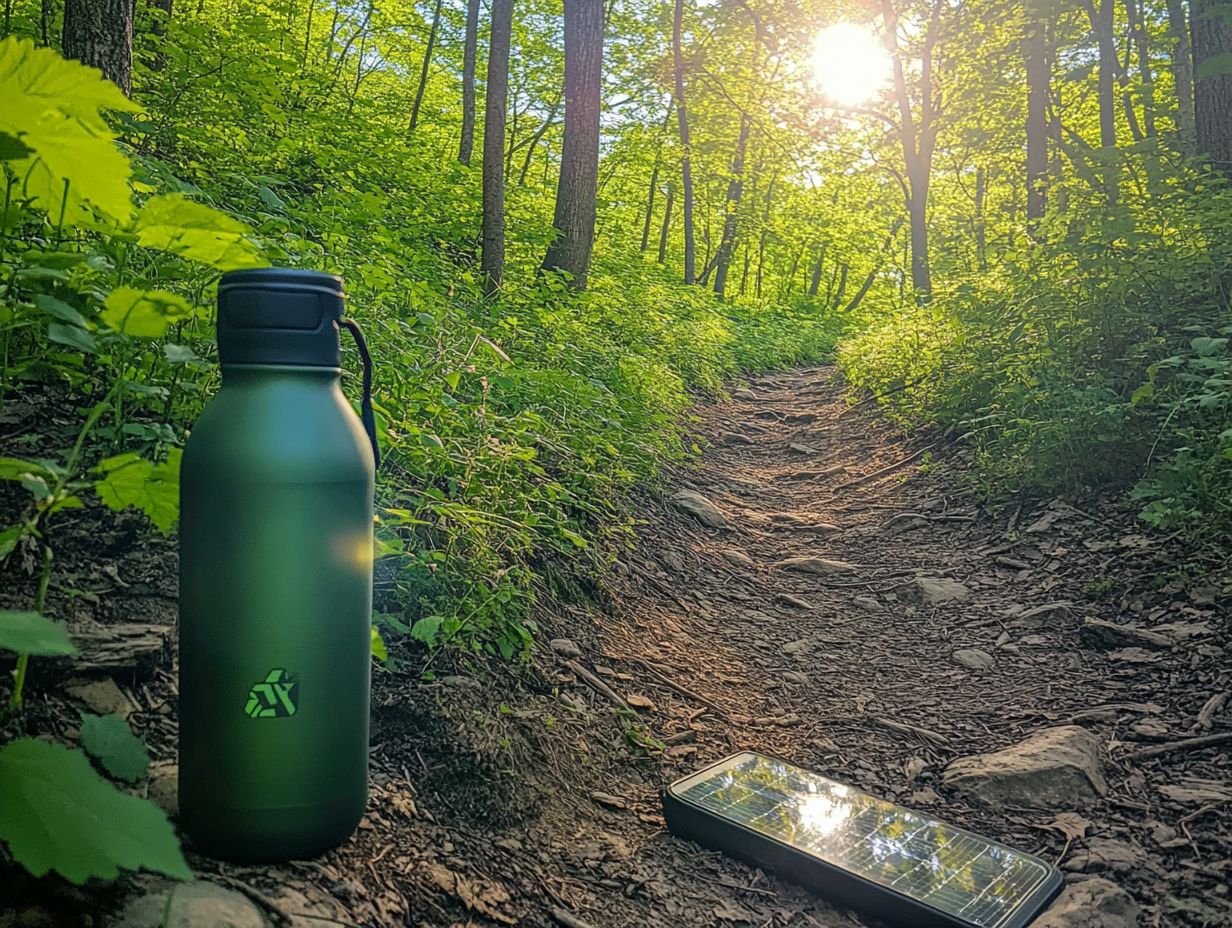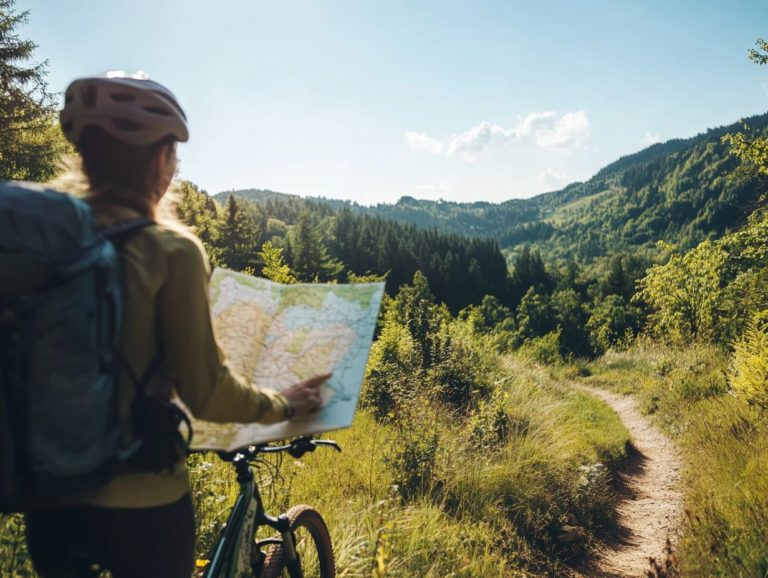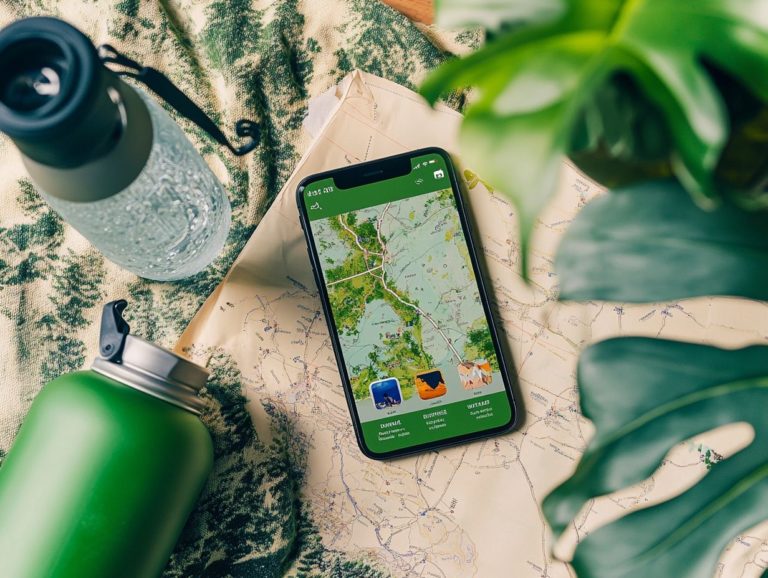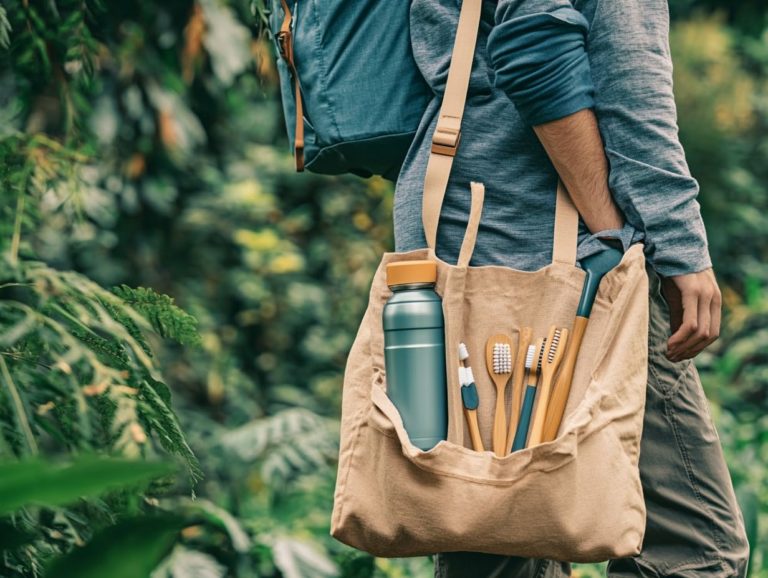5 Eco-Friendly Travel Hacks You Need to Know
Traveling doesn t have to compromise the well-being of our planet. As more individuals adopt eco-conscious lifestyles, it becomes crucial to reflect on how your adventures impact the environment.
This article delves into five straightforward yet powerful eco-friendly travel hacks. Get ready to discover practical tips that will make your travels more responsible and exciting!
From packing reusable items to supporting local businesses and selecting sustainable accommodations, you ll find practical tips designed to enhance your responsible travel experience.
Embark on this journey to ensure your next trip is not only enjoyable for you but also beneficial for the Earth.
Contents
- Key Takeaways:
- 1. Pack Reusable Items
- 2. Use Public Transportation or Walk
- 3. Choose Eco-Friendly Accommodations
- 4. Support Local Businesses
- 5. Reduce Water and Energy Usage
- Why Should You Travel Eco-Friendly?
- Frequently Asked Questions
- What are the benefits of eco-friendly travel?
- How can I minimize my plastic usage while traveling?
- What are some ways to reduce energy consumption while traveling?
- How can I support sustainable practices while dining on my trip?
- What are some eco-friendly travel accessories I should bring?
- How can I be a responsible tourist while exploring natural areas?
Key Takeaways:

Pack reusable items to reduce waste and help the environment.
Opt for public transportation or walk when possible to lower carbon emissions.
Choose eco-friendly accommodations for a more sustainable travel experience.
1. Pack Reusable Items
As an eco-conscious traveler, packing reusable items like water bottles, shopping bags, and utensils is essential. This helps minimize waste and promotes sustainable practices.
Choosing these alternatives reduces reliance on single-use plastics. This contributes to the movement toward living with no waste. Consider reusable silicone food bags, which serve as excellent replacements for traditional plastic wraps and containers; they re both practical and environmentally friendly. When you choose bamboo cutlery sets, you eliminate the need for disposable utensils entirely.
These thoughtful choices align perfectly with sustainable travel principles. They emphasize the importance of leaving minimal footprints while fostering a deeper connection with nature. As you make these informed decisions, you can also explore 5 inspiring eco-conscious travel blogs to follow, which can inspire those around you to join the quest for a cleaner, greener planet.
2. Use Public Transportation or Walk
Using public transportation or walking not only elevates your travel experience but also significantly lessens your carbon footprint. This makes it a key element of responsible travel.
By embracing these modes of transport, you play a vital role in energizing local economies, stimulating businesses, and creating jobs. Take cities like Amsterdam and Tokyo as prime examples; their successful public transport systems ease traffic congestion while boosting tourism and local commerce.
In Amsterdam, the seamless integration of bikes and trams cultivates a dynamic urban culture. Meanwhile, Tokyo s efficient rail network ensures smooth connectivity, enabling both residents and visitors to explore the city effortlessly. This synergy benefits not just individuals but also nurtures sustainable urban growth and strengthens community bonds.
3. Choose Eco-Friendly Accommodations
Selecting eco-friendly accommodations is crucial for your sustainable tourism journey. These establishments prioritize ethical practices and often positively impact the local economy.
When searching for a place to stay, look for certifications like LEED (Leadership in Energy and Environmental Design) or Green Globe. These badges signify a strong commitment to sustainability.
Many eco-friendly hotels actively engage with local communities by sourcing food from nearby farms, employing local staff, or supporting community projects. Take the Proximity Hotel in Greensboro, North Carolina, for instance; not only is it LEED Platinum certified, but it also harnesses solar panels and energy-efficient systems. Likewise, the Treetops Eco-Resort in Malaysia emphasizes conservation while offering immersive experiences in nature.
Choosing such accommodations elevates your travel experience and instills a sense of responsibility towards preserving our planet.
4. Support Local Businesses

Supporting local businesses while traveling enriches your experience and plays a vital role in boosting the local economy and nurturing community ties.
When you choose to dine at locally-owned restaurants, you indulge in authentic flavors while enhancing the livelihoods of talented chefs and dedicated waitstaff. Exploring local markets presents a delightful opportunity to discover unique handmade crafts and fresh produce, ensuring your purchases positively impact local artisans and farmers.
Local guides can provide great insights and deepen your understanding of the culture and history of your destination. Consider volunteering to connect with community members and create lasting memories while championing social responsibility.
5. Reduce Water and Energy Usage
Reducing water and energy usage while traveling is essential for sustainable travel. It minimizes your environmental impact and supports conservation efforts. By adopting eco-friendly practices, you can significantly contribute to preserving our precious natural resources.
A typical hotel room uses around 140 gallons of water daily. Making small changes, like taking shorter showers or reusing towels, can have a meaningful impact. Turn off your devices when not in use to save energy.
Regarding accommodations, seek places that prioritize sustainability, such as those that utilize energy-efficient appliances or harness solar power. These choices help reduce your personal resource consumption and promote a culture of environmental awareness within the tourism industry. Additionally, consider incorporating >5 ways to reduce plastic waste while traveling into your travel plans.
Why Should You Travel Eco-Friendly?
Traveling eco-friendly is essential now more than ever! It plays a key role in wildlife preservation, reducing carbon emissions through innovative offset programs, and supporting climate activism efforts globally.
This approach nurtures a profound connection with nature and urges you to adopt sustainable practices that safeguard ecosystems and enhance biodiversity. By choosing to support local communities and conservation initiatives, you actively contribute to preserving habitats crucial for countless species.
When you make mindful choices to reduce your environmental footprint, you embark on enriching experiences while positioning yourself as an advocate for climate change initiatives. For example, consider following 7 tips for eco-friendly road trips that can inspire others to embrace greener habits, amplifying the impact on global conservation efforts aimed at protecting the planet for generations to come.
What Are the Benefits of Using Reusable Items While Traveling?
Using reusable items while traveling, like a sturdy water bottle, is crucial for your goal of producing no waste and champions eco-friendly products that resonate with sustainable travel practices.
These items help you minimize plastic waste, a significant environmental concern today, and offer substantial cost savings over time. Imagine refilling a durable water bottle instead of buying single-use ones throughout your journey. It’s not just an eco-conscious decision; it’s also a savvy financial move. For those looking for more ways to enhance their travel experience, consider exploring 5 educational eco-conscious tours to take.
Choosing reusable containers for your snacks or toiletries simplifies your packing and organization, leading to a more enjoyable travel experience. By making these sustainable choices, you actively contribute to a healthier planet while enriching your adventures with the peace of mind that comes from responsible consumption. Emphasizing why eco-friendly travel should be a priority enhances your travel experience even further.
How Can You Find Eco-Friendly Accommodations?

Finding eco-friendly accommodations is crucial for sustainable tourism. You can easily achieve this through a little research and leveraging local guides.
To kick things off, explore online platforms that specialize in sustainable lodging. These resources can help you uncover options that align with your values. Additionally, consider checking out 5 eco-friendly ways to explore national parks. Websites like EcoBnB and Green Key are excellent starting points for identifying hotels committed to environmental preservation.
Look for certifications from reputable organizations; these badges signify a hotel’s dedication to eco-friendly operations. Additionally, consider learning how to pack light for eco-friendly travel to further enhance your sustainable experience. Check guest reviews to gain insights into the hotel’s sustainable practices, such as energy-efficient systems or locally-sourced food offerings.
For example, properties like The Brando in French Polynesia and Hotel Pullman in Bangkok not only embrace eco-friendly initiatives but also ensure your stay is filled with comfort and luxury.
What Are Some Ways to Support Local Businesses While Traveling?
Supporting local businesses while traveling strengthens the local economy and allows you to engage meaningfully with the community through volunteer opportunities and the expertise of local guides.
When you choose to dine at family-owned restaurants, shop at local markets, and hire skilled local guides, you open the door to authentic cultural exchanges. These interactions foster deeper connections with your destination and its people, transforming your travel experience.
For instance, enjoying a meal at a local eatery often means savoring home-cooked dishes made from fresh, regional ingredients, offering a glimpse into the local cooking styles of the area. Local guides can unveil hidden gems and share captivating stories, turning the standard sightseeing trip into an unforgettable adventure.
By building relationships in these vibrant settings, you create lasting memories while supporting the livelihoods of those who call these remarkable places home.
How Can You Reduce Your Water and Energy Usage While Traveling?
Reducing water and energy usage while traveling is not only feasible but a powerful way to lower your environmental impact and promote a culture of eco-friendliness.
By being mindful of your resource consumption, you can make a real impact! For example, when you re staying in hotels, think about reusing towels and turning off lights and electronics when they re not in use.
Choosing energy-efficient transport options like public transit, biking, or walking doesn t just cut down on carbon emissions; it also offers a more immersive experience as you explore your destination.
Sharing these conscious choices with fellow travelers can spark a collective dedication to sustainability, inspiring others to adopt similar habits and embrace top sustainable travel practices to follow that help preserve our planet.
What Are Some Other Ways to Travel More Sustainably?
Traveling more sustainably involves a range of practices, from participating in programs that help reduce carbon footprints to supporting wildlife preservation efforts. This ensures that every journey you embark on is both intentional and impactful.
In your pursuit of meaningful exploration, consider selecting eco-friendly tour operators that prioritize environmental stewardship and community welfare. Additionally, you can explore 5 green activities for your next eco-trip to make your travels more sustainable. Engaging in climate activism amplifies your voice while advocating for the planet’s health.
Choosing sustainable travel gear think reusable water bottles and ethically sourced apparel further aligns your adventures with a commitment to reducing waste. Each conscious decision enhances your personal experiences and deepens your connection to the ecosystems and cultures you encounter.
Frequently Asked Questions

What are the benefits of eco-friendly travel?
Eco-friendly travel lowers your environmental impact. It conserves resources and supports local communities.
How can I minimize my plastic usage while traveling?
Bring a reusable water bottle and tote bag. Use refillable toiletry containers and skip single-use plastics.
What are some ways to reduce energy consumption while traveling?
Choose eco-friendly places to stay. Turn off lights and electronics when you re not using them.
Use public transport or walk instead of renting a car.
How can I support sustainable practices while dining on my trip?
Seek out local restaurants that use fresh, local ingredients. Avoid chain restaurants to reduce food waste.
What are some eco-friendly travel accessories I should bring?
Pack a reusable utensil set and a collapsible travel mug. A solar-powered charger can also help you save energy.
How can I be a responsible tourist while exploring natural areas?
Stay on marked trails and avoid littering. Respect wildlife and their homes.
Join a local conservation or clean-up activity during your trip!






